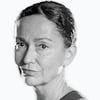Anne Boyer, poet: ‘Denying hatred isn’t good for you, you need to let it out’
Her memoir – ‘The Undying: A Meditation on Modern Illness’ – went beyond her own medical treatment. When it comes to searching for the causes of cancer, she writes how, in addition to studying genes, it’s just as important to examine the water we drink. The Pulitzer Prize-winning poet has also criticized the hypocrisy of certain patrons of scientific research. An American now living and teaching in Scotland, she spoke with EL PAÍS while on a visit to Madrid
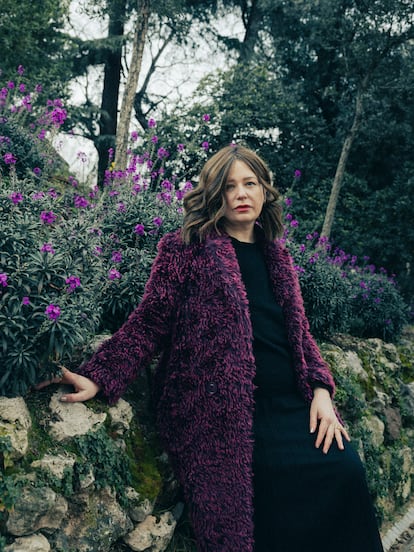
“The relationship with the disease portrays us as a society. The failure of breast cancer isn’t the people who die, but the world that makes them sick,” summarizes Anne Boyer. The 50-year-old author of collections of poems and essays such as A Handbook of Disappointed Fate (2018), she won the Pulitzer Prize for General Nonfiction for The Undying: A Meditation on Modern Illness (2019), which examines the notion of illness in a capitalist world.
Boyer, who was born in Topeka, Kansas, believes that, rather than people having cancer, it is the world that has cancer. “What does it mean when we spend more money covering up the causes of cancer, rather than researching it? What does it mean when there are people who die because they cannot afford treatment?”
Her interview with EL PAÍS takes place in Madrid. Boyer asks that she not be photographed in a medical setting.
Question. Does money decide who gets cured of cancer?
Answer. In the United States, our healthcare system is completely driven by profit. The social inequality that defines the country today also determines one’s experience with the disease. The world privatizes survival.
Q. And you didn’t realize this until, at the age of 40 — as a single mother, with no savings or partner — you faced triple-negative breast cancer (TNBC).
A. Like many Americans, I went years without health insurance. Even though I was a university professor, it was impossible for me to afford it. I have friends who have stitched their own wounds because going to the emergency room would have devastated their finances.
Q. What happened when your daughter was born?
A. I was very poor back then. That meant that I qualified for Medicaid — the public health insurance program — to get into a hospital. Medicaid is for people below the poverty line. That’s turned it into a stigma. Instead of appreciating that medical help exists, it’s become shameful to have to resort to it. Doing so makes you an outcast, a loser.
Q. Why is needing medical help associated with shame in the United States?
A. It’s the ideology of the country. From a young age, we’re taught to compete. Ours is a culture taught through the language of war. It contrasts conquerors with the conquered and the victorious with victims. In my childhood, sports weren’t mere games: they were competition. Even in my world, instead of understanding art as something capable of expanding and improving life, it was seen as competition: being the best at drawing or writing won you prizes. Writers or painters who don’t succeed don’t contribute to society. I received an education that taught me to be a hero. And not everyone can be one. American society is wonderfully pluralistic. It should be an extraordinary human experience. The American dream could have made that mixture flourish. The nightmare is that, by putting economic profitability first, society is polarized, because the number of people with nothing to lose grows on a daily basis. The feeling is that nearly half of the population either doesn’t matter, or doesn’t deserve to live. In the United States, the country of diversity, being different is a problem.
Q. So what are you doing there?
A. Well, since September [of 2023], I’ve been living in Scotland. I love Kansas City University, where I taught. But there, the homeless population has grown to dystopian levels. And it’s not just homelessness: there’s addiction and mental illness. It’s as if a good part of the population has become disposable.
Q. What do you do in Edinburgh?
A. I teach creative writing at the University of St. Andrews. It’s clear why education has been useful for me: you don’t have to be the best.
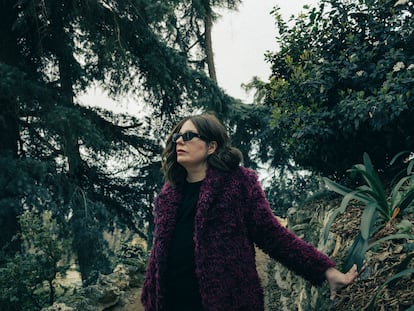
Q. But you won the Pulitzer Prize for General Nonfiction. Didn’t the winners and losers system work for you?
A. I loved my job before receiving the award. Having contact with young people who want to dedicate their lives to art is stimulating. But I saw how the prioritization of profitability was reaching my university, which was like an island of knowledge.
Q. You were diagnosed with a very aggressive form of breast cancer.
A. I noticed a lump in my chest, but I ignored it. Enough had already happened to me in my life! Cancer is neither visible nor painful. Triple-negative breast cancer has a miserable position in the history of cancer, due to its high mortality rate. It’s the least-studied. And it usually affects vulnerable people: young people who are over 30 years old, who don’t have the right to receive free check-ups. Since there’s no specific cure, these patients receive chemotherapy… which is like jumping off a building when someone is pointing a gun at you. It’s a solution, but perhaps it’s too radical. Of course, it allows lawsuits to be avoided. Lucretius wrote that one could die inch by inch… the cure for cancer proves it.
Q. You got married when you were 20 years old.
A. And it was a disaster. I didn’t have a good childhood. We lived in Celina (Texas), a place halfway between New York and Los Angeles. There were only storms, snowfalls and tornadoes. It has a hill, where the rich people live — the rest of the residents live on the plain. In the 1980s, it was populated by anti-communists and fundamentalist Christians. My friends and I didn’t fit in. I spent my childhood being constantly punished at school and at home. I wasn’t trying to fit in. How are you going to want to fit into such an unfair and harmful system? Every year on my birthday, my mother said that they had switched her baby at the hospital.
Q. Do you have siblings?
A. One. He adjusted. He made the football team, he dated a cheerleader. I adore him, but the truth is that he always fit in. At home, [my parents] told me that I was going to get a brain tumor, because all I did was read.
Q. And your father?
A. My father… I have a colorful family history. My paternal grandmother was left without a mother when she was two years old. At a very young age, she fell in love with a country music singer. She became pregnant and they decided to move to an abandoned gold mine in Arizona. My grandmother was like me, someone unable to keep quiet about what she thinks. So, [the singer] soon got fed up and abandoned her on the road. She survived by picking cotton, pregnant with my father. When he was born, she returned to Celina and took a job as a maid. My father was able to go to law school and became a judge in Celina. He wasn’t a resentful man, but he never moved to live on the hill with the powerful people. He never bought a fancy car. He kept his childhood friends. My father couldn’t stand the world that had rejected him and his mother. And he, of course, was the one who opened the door to books for me. He had many. I read them all. He died five years ago. Like my mother.
Q. Did you ever talk to your mother about your estrangement from your society?
A. We didn’t get around to it. She was in too much pain. I couldn’t even tell her that I had been given a scholarship to Cambridge University.
Q. Have you managed to avoid feeling resentment?
A. I always dreamed of revenge. That became a driving force for me: to take revenge through culture. Denying hatred isn’t good for you. You have to let it out.
Q. Does revenge liberate you, or sink you?
A. When I was a teenager, several of my friends killed themselves and, at the funeral, the priest talked about how gays would go to hell. The United States isn’t the democratic and liberal country that we’re led to believe it is. The writer has to shine the light on what doesn’t work in the world into which they were born.
Q. You found a sisterhood in the work of other writers.
A. I devoured them to try to learn something about the disease. Susan Sontag wrote: “To think only about oneself is to think of death.” What I learned is that all the female authors who write about being sick say that it’s not possible [to write about this subject]. But they still do it.
Q. Do you align with the idea that art can be curative?
A. I don’t believe that beauty heals. I believe in an art that helps you think. Writing The Undying wasn’t therapeutic. It didn’t cure me psychologically. But a book can talk to you about power. I needed to write that what’s more important than looking at genes is to analyze the public water distribution system, so that we can find out where cancers come from. Of course, genes play a role… but what we share is the environment. In the United States, there’s a lot of pressure to deregulate environmental laws, so that industries can continue polluting. Why can’t we get grants to research the environmental causes of cancer? To give back to society, I feel that I must look beyond myself.
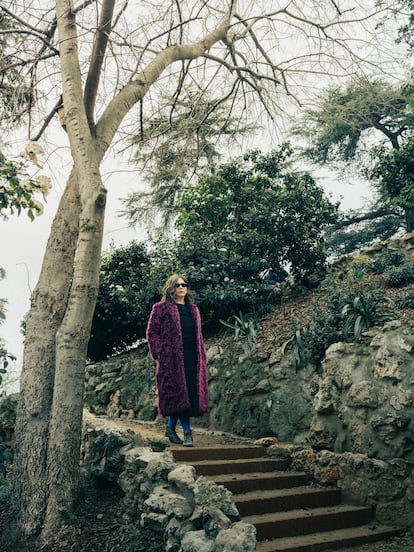
Q. The World Health Organization has published widely about the relationship between cancer and cars that run on diesel or gasoline, and about the relationship between cancer and tobacco.
A. It’s a tragedy for the world that in the United States, which has some of the most capable laboratories and scientists, research depends on the patronage of large companies. In the end, who decides what gets researched?
Q. We use less plastic, there are fewer and fewer cars in cities. Is nothing getting better?
A. I’m very slightly optimistic about what may happen in the United States. But throughout my life, I’ve only seen the country get worse.
Q. How did you pay for your cancer treatment?
A. I had medical insurance, with a deductible. One of my chemotherapy infusions cost more than what I earned in a year. My friends got together and contributed the missing amount: thousands of dollars.
Q. They deserve a monument.
A. I hope that to them, the book is one.
Q. You once wrote that you said goodbye to all of your lovers by sleeping with them.
A. It really happened.
Q. How many lovers?
A. That I won’t say.
Q. You’re against pink ribbons, the universal symbol to raise awareness about breast cancer.
A. It’s not just that the survivors’ party hides the deaths… it’s that it demands happiness from them for being diminished. It hides the lack of investment in research and allows those who want to use it as a lure to sell their products to participate in the cure. Cancer with little possibility of being cured hides a lot of suicides. The novelist Kathy Acker refused chemotherapy in 1996 because she preferred to have quality of life in her final months. Many of her friends felt that she denied [the reality] of the disease. But to me, the audacity with which she chose to experience her final days made perfect sense. That’s how she was. Others want to live as long as possible, but we don’t all want the same thing. Yet whoever doesn’t follow the usual procedures is seen as a crazy person, as a loser. People punish the dead who haven’t undergone standard treatments even though, in a few years, we’ll see chemotherapy like bloodletting: a retrograde practice. There are people researching less harmful cures. I think most doctors would like to move on to other types of treatments. But today, not being submissive [to the status quo] makes you crazy in the eyes of many people.
Q. You don’t agree with people hiding that they have cancer. And yet, you arrived at your chemotherapy sessions with painted nails.
A. I wasn’t trying to look like a model or an influencer: I wanted to be in control of my appearance in the middle of something that controlled every part of my body. The search for beauty is the most praiseworthy thing in life and humanity. But the need for you to look good so that others don’t worry isn’t beauty — it’s a disguise. It’s ugly, the opposite of beauty.
Q. Some activists have equated breast cancer with AIDS to demand more research funds.
A. Breast Cancer Action is the only organization I would donate to. They report on “pinkwashing”: when chemical and weapons companies add a little pink bow to their products to show solidarity.
Q. Does getting cancer open your eyes, or does it narrow your field of vision?
A. It’s been one of the experiences that have defined my life. What’s different from the experience of other women who’ve written about the disease is that I’ve lived it amidst the flow of information and misinformation that’s on the internet.
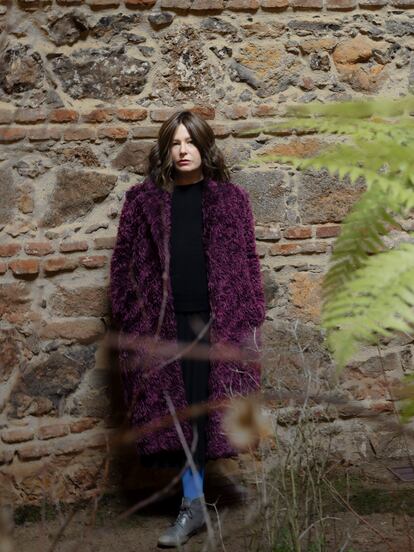
Q. Some people announce to strangers that they’re sick.
A. Christina Newman, a YouTuber, rejected chemo. She opted for a diet that she was telling everyone about. She had many followers and she eventually dissuaded them from making the same decisions that she made. She died at 39 years of age. Taking someone’s doubts as information is dangerous.
Q. Then there are people who pretend that they’re sick.
A. Fraud committed by doctors, by supposed “patients” or by researchers do a lot of harm. I’ve also developed empathy towards them. Belle Gibson, an Australian blogger, was “the most inspiring woman of the year” for Elle magazine. She treated her cancer of the blood, spleen and brain with a diet. But she didn’t have cancer. Kelsey Whitehead, from the UK, shaved her hair and had a Hickman catheter surgically implanted. The judge convicted her of fraud. [Fake patients] have received donations, they’ve purchased cars and houses. But some doctors can also deceive you: Farid Fata, a hematologist from Michigan, was sentenced to 45 years in prison for administering chemo to people without cancer. Surgeon Ian Paterson [was jailed] for removing breasts. Towards them, I felt more pity than anger.
Q. Are patients more willing to take risks than doctors?
A. I switched doctors because [my oncologist] wasn’t willing to give me the most aggressive treatment. He told me that he had known patients who hadn’t tolerated the treatment… how could he recommend it? And, at the same time, how can you not try it?
Q. In the United States, 45% of mastectomies are outpatient procedures, in which the patient goes home the same day of the operation.
A. You cannot drive home the day you’ve had a double mastectomy… so what do you do if you don’t have friends around? The United States doesn’t allow a hospital bed [to be allocated for those receiving the procedure], but, by federal order, reconstructive surgery is covered. What does that say about us? Well, it says that image is more important [than care].
Q. Is there a better way to reconstruct the chest?
A. That industry is, at its best, an evolving field of knowledge. At worst, it’s a business. I was ill for years from having my breasts reconstructed with silicone — I had ganglia coming out. My oncologist finally told me that they’d proven that this esthetic reconstruction caused side effects and could even hide tumors. He advised me to get rid of the silicone. The day after the operation, for the first time in seven years, the vertigo disappeared and my nails grew back. I’m not talking about delusions, these are facts. I know that [these side effects] don’t happen with all patients, but if by talking about my experience I can help someone…
I never lost the will to live during my treatment. But during the years when I lived with silicone poisoning — when I thought that my life was always going to be like this — I stopped wanting to live. Today, my chest is flat, but I can move my arms. I don’t feel dizzy, I can think. I got my life back.
Q. Which is the best reconstruction option after a mastectomy?
A. [The one which uses tissue from] your gluteal muscle, which produces less rejection. But it requires several operations and hospitalizations. I want to say something else: I got married with a flat chest. If someone is afraid of losing love over something like that, they’re wrong. You see, finding a partner that you love and who loves you is always an adventure, with and without cancer. But whoever loves you wants you to be well, regardless of what your breasts are like.
Q. What has surviving triple negative breast cancer changed in your life?
A. I’m more empathetic when it comes to the suffering of others, whether or not it’s caused by an illness. I feel the double gift of knowing how to handle the language [of cancer] and of still being in the world. Writing requires a lot of effort and, in the end, you may not be able to convey what you really wanted to say. But I have to do it. There’s no corner of the world that’s not touched by inequality. And these problems — which are beyond the diseases — magnify the diseases. Intellectually, I knew this already. But, at least for me, it’s no longer a theory.
Translated by Avik Jain Chatlani.
Sign up for our weekly newsletter to get more English-language news coverage from EL PAÍS USA Edition
Tu suscripción se está usando en otro dispositivo
¿Quieres añadir otro usuario a tu suscripción?
Si continúas leyendo en este dispositivo, no se podrá leer en el otro.
FlechaTu suscripción se está usando en otro dispositivo y solo puedes acceder a EL PAÍS desde un dispositivo a la vez.
Si quieres compartir tu cuenta, cambia tu suscripción a la modalidad Premium, así podrás añadir otro usuario. Cada uno accederá con su propia cuenta de email, lo que os permitirá personalizar vuestra experiencia en EL PAÍS.
¿Tienes una suscripción de empresa? Accede aquí para contratar más cuentas.
En el caso de no saber quién está usando tu cuenta, te recomendamos cambiar tu contraseña aquí.
Si decides continuar compartiendo tu cuenta, este mensaje se mostrará en tu dispositivo y en el de la otra persona que está usando tu cuenta de forma indefinida, afectando a tu experiencia de lectura. Puedes consultar aquí los términos y condiciones de la suscripción digital.
